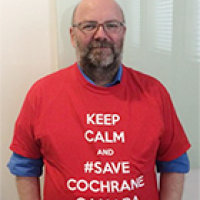
Jeremy Grimshaw was in Australia this month sharing his insights on behavioural science and evidence synthesis with researchers and government policymakers at Monash University’s BehaviourWorks. Between workshops, meetings and a brief pit stop at the Melbourne Grand Prix, the former Director of Cochrane Canada and new Chair of the Campbell Collaboration found time to share his thoughts on the many professional and personal pursuits that continue to inspire him.
You’d be hard pressed to find too many esteemed scientists who can talk as easily about evidence-based medicine as they can about experimental music festivals. Jeremy Grimshaw is one such person who can make complex behavioural science, obscure musical compositions and the Formula 1 racing circuit the most comfortable of companions in a single conversation. You could say he’s not your everyday scientist and you’d be right. Just ask Reuters, who last year named him ‘one of the most influential scientific minds of our time’. It’s a high-profile honour that he reflects on with a little reluctance and a lot of humility.
‘While on one level it’s nice to be recognised in this way, I think science is really a team sport,’ Jeremy says. ‘I work with incredibly smart people who bring insights from their fields into my content area and I really benefit from that. Or to use a more musical analogy, I often think of myself in a kind of conductor role, and the quality of the work we produce is really a reflection of the amazing orchestra.’
Jeremy has spent the last two decades collaborating on cross-disciplinary compositions with colleagues from around the globe. A shared belief that evidence-based medicine should be complemented by evidence-based implementation underpins their work. ‘We’ve long known that the process of translating research into practice can be slow and haphazard. The gap between research-based best clinical practice and what clinicians actually do has been my focus since day one. For me, it’s always been about changing clinical behaviours in complex settings to achieve effective knowledge translation and better health outcomes.'
Jeremy’s application of behavioural science in implementation research has led to widespread improvements in patient care around the world and contributed to the emergence of the relatively new field of health services research. His innovative approach has also been influential within Cochrane, where he has held many senior leadership positions, including Co-Chair from 2010 to 2014 and Co-ordinating Editor of the Effective Practice and Organisation of Care Group from 1997 to 2015. Just this week he stepped down from his role as Director of Cochrane Canada, which he has held since 2005.
‘I feel incredibly proud of what we’ve achieved at Cochrane Canada during the last 11 years,’ Jeremy reflects. ‘It’s been such a rewarding experience and I’ve worked among an extraordinary team of people. The time is now right for change though, and I know the next generation of leadership is ready to bring fresh energy, ideas and approaches to our work and the challenges we continue to face.’
Jeremy’s departure comes at the end of a difficult couple of years for the organisation. In 2014, the Canadian Institutes of Health Research announced that Cochrane Canada’s funding would not be renewed due to changes to national funding mechanisms. In response Jeremy and his team have worked tirelessly on the Save Cochrane Canada campaign to highlight the extraordinary and tangible contributions the organisation makes to health evidence and outcomes in Canada and beyond, and secure new sources of ongoing funding.
While uncertainty remains, the recent election of the Trudeau government has provided new hope and impetus for the campaign, as Jeremy explains. ‘The new government espouses evidence-informed policy-making and has shown a willingness to engage in a broader debate with evidence as a major input, so that’s promising. While the last year has been difficult and at times very frustrating, I do have a sense that the tide is starting to turn and we may have new funding opportunities to explore in the near future. So in many ways it’s a good time for me to move on. Holger Schünemann will do a fantastic job as new Director and the Centre is returning to its spiritual home at McMaster. I know I’m leaving Cochrane Canada in very good hands.’
Jeremy’s focus now shifts to his new role as Chair of the Campbell Collaboration. Campbell shares Cochrane’s mission to undertake systematic reviews to inform decision making, but with a focus on social policy rather than health. ‘Campbell wanted someone with both a good sense of the systematic review world and an understanding of the practical and strategic issues that global collaborative organisations face. I suggested that with my experience with Cochrane I could be just the person to help, and happily they agreed. I’m now really excited to have the opportunity to work together with new CEO Howard White on realising positive social change through public policy, and making Campbell much more impactful. It should be a lot of fun.’
Again it seems unlikely the term fun would feature much in a conversation covering a stellar scientific career characterised by high-profile leadership responsibilities, complex research projects and a prolific publication schedule. But fun and time out are clearly a great source of energy, inspiration and sustenance for this most influential of scientific minds, and he tries to accommodate them accordingly.
‘Both my family and colleagues would be quick to tell you I’m constantly overcommitted,’ he laughs. ‘I always have so much going on, but do recognise that I need periods of down-time to relax and recharge. For the most part I do this by tacking on ‘micro-spaces’ filled with motor racing or music after international meetings. So this month I was trackside at my fourth Melbourne Grand Prix, while next month I’ll be catching classical and contemporary music at the Big Ears Musical Festival in Tennessee. These kinds of joyful things leave me feeling enriched, energised and ready for the next challenge.’
Words: Shauna Hurley
Image: Jeremy Grimshaw
